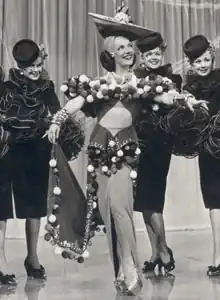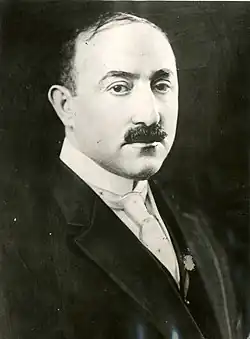Portal:20th Century Studios
The 20th Century Studios Portal
.svg.png)
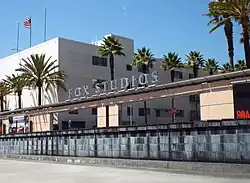
20th Century Studios, Inc., formerly 20th Century Fox, is an American film production and distribution company owned by the Walt Disney Studios, the film studios division of the Disney Entertainment business segment of the Walt Disney Company. It is headquartered at the Fox Studio Lot in the Century City area of Los Angeles, which is leased from Fox Corporation. Walt Disney Studios Motion Pictures distributes and markets the films produced by this studio in theatrical markets.
For over 80 years, 20th Century has been one of the major American film studios. It was formed in 1935 as Twentieth Century-Fox Film Corporation by the merger of Fox Film Corporation and Twentieth Century Pictures, and one of the original "Big Five" among eight majors of Hollywood's Golden Age. In 1985, the studio removed the hyphen in the name (becoming Twentieth Century Fox Film Corporation) after being acquired by Rupert Murdoch's News Corporation, which was renamed 21st Century Fox in 2013 after it spun off its publishing assets. Disney purchased most of 21st Century Fox's assets, which included 20th Century Fox, on March 20, 2019. The studio adopted its current name on January 17, 2020, in order to avoid confusion with Fox Corporation, and subsequently started to use it for the copyright of 20th Century and Searchlight Pictures productions on December 4. 20th Century is currently one of five live-action film studios within the Walt Disney Studios, alongside Walt Disney Pictures, Marvel Studios, Lucasfilm, and its sister speciality unit, Searchlight Pictures. 20th Century also releases animated films produced by its animation division 20th Century Animation.
The most commercially successful film franchises from 20th Century Studios include the first six Star Wars films, X-Men, Ice Age, Avatar, and Planet of the Apes. Additionally, the studio's library includes many notable films such as The Sound of Music and Titanic, both of which won the Academy Award for Best Picture and became the highest-grossing films of all time during their initial releases. (Full article...)
Selected article

Following Star Wars' success, Lucas hired Brackett to write the sequel. Following her death in 1978, he outlined the whole Star Wars saga and wrote the next draft himself, before hiring Raiders of the Lost Ark (1981) writer Kasdan to enhance his work. To avoid the stress he faced directing Star Wars, Lucas handed this responsibility to Kershner and focused on expanding his special effects company Industrial Light & Magic instead. Filmed from March to September 1979, in Finse, Norway, and Elstree Studios in England, The Empire Strikes Back faced production difficulties, including actor injuries, illnesses, fires, and problems securing additional financing as costs rose. Initially budgeted at $8 million, costs had risen to $30.5 million by the project's conclusion.
Released on May 21, 1980, the highly anticipated sequel became the highest-grossing film that year, earning approximately $401.5 million worldwide. Unlike its predecessor, Empire was met with mixed reviews from critics and fans conflicted over its darker and more mature tone compared to the light-hearted Star Wars. Critics praised the puppeteered character Yoda, a diminutive alien that serves as Luke's teacher, for having expressive features and characterization. The film was nominated for various awards and won two Academy Awards, two Grammy Awards, and a BAFTA, among others. Subsequent releases have raised the film's worldwide gross to $538–549 million and, adjusted for inflation, it is the thirteenth highest-grossing film in the United States and Canada.
Selected image
Original teaser trailer of the film Planet of the Apes (1968)
General images -
Selected biography

During the 1930s, Miranda performed on Brazilian radio and appeared in five Brazilian chanchadas, films celebrating Brazilian music, dance and the country's carnival culture. Hello, Hello Brazil! and Hello, Hello, Carnival! embodied the spirit of these early Miranda films. The 1939 musical Banana da Terra (directed by Ruy Costa) gave the world her "Baiana" image, inspired by Afro-Brazilians from the north-eastern state of Bahia.
In 1939, Broadway producer Lee Shubert offered Miranda an eight-week contract to perform in The Streets of Paris after seeing her at Cassino da Urca in Rio de Janeiro. The following year she made her first Hollywood film, Down Argentine Way with Don Ameche and Betty Grable and her exotic clothing and Lusophoneaccent became her trademark. That year, she was voted the third-most-popular personality in the United States; she and her group, Bando da Lua, were invited to sing and dance for President Franklin D. Roosevelt. In 1943, Miranda starred in Busby Berkeley's The Gang's All Here, which featured musical numbers with the fruit hats that became her trademark. By 1945, she was the highest-paid woman in the United States.
Did you know (auto-generated)

No recent additions
Selected quote
Topics
Recognized content
Subcategories

Related portals
WikiProjects
![]()
- Parent projects
- Arts • Animation • Disney • Entertainment • Film • Television • Visual arts
- Main project
- 20th Century Studios
- Sub-projects
- Blue Sky Studios • Diary of a Wimpy Kid • Family Guy • Marvel
- Related Projects
- Alien • Biography • Comics • Fictional characters • Media franchises • Music • Video games • The Simpsons • Star Wars
Things you can do

- Requested articles: More...
- Stubs: Work on stubs in articles in 20th Century Studios stubs.
- Attention: See Category:20th Century Studios articles needing attention for any articles which may require attention.
- AfD Discussions: Monitor 20th Century Studios-related AfD discussions at Wikipedia:WikiProject Deletion sorting/20th Century Studios.
- Cleanup: A Century Studios.html cleanup listing for this project is available. See also Century Studios.html the list by category, the tool's wiki page and the index of WikiProjects.
- Infobox: See Category:20th Century Studios articles needing infoboxes for any articles which may require an infobox.
- Article alerts subpage - Monitor article alerts, for more information see Wikipedia:Article alerts
- Tag the talk pages of 20th Century Studios-related articles with the {{WikiProject 20th Century Studios}} banner.
- Rate the Unassessed 20th Century Studios articles, Unknown-importance 20th Century Studios articles and articles where an assessment has been requested.
- Notability: Articles with notability concerns, listed at WikiProject Notability
Associated Wikimedia
The following Wikimedia Foundation sister projects provide more on this subject:
-
Commons
Free media repository -
Wikibooks
Free textbooks and manuals -
Wikidata
Free knowledge base -
Wikinews
Free-content news -
Wikiquote
Collection of quotations -
Wikisource
Free-content library -
Wikiversity
Free learning tools -
Wikivoyage
Free travel guide -
Wiktionary
Dictionary and thesaurus
-
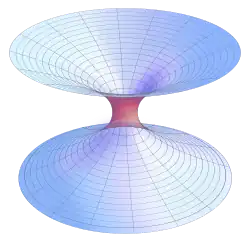 List of all portals
List of all portals -

-

-

-

-

-

-

-

-

-
 Random portal
Random portal -
 WikiProject Portals
WikiProject Portals

.jpg)
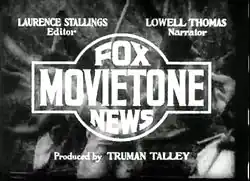

.jpg)
